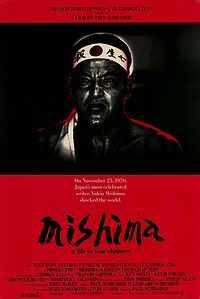
This highly-stylized "biopic" is an impressive, experimental endeavor by director Paul Schrader. Focusing on the life of Japanese writer/actor/militarist Yukio Mishima, he expertly blends history with fantasy and the literary. To give a straightforward summation of what the film is about would be highly difficult, for it's operating on a number of complex levels. The main storyline is that of Mishima (played in this timeline by Ken Ogata) on the last day of his life as he prepares to stage a bloodless coup at a military complex - his hope being to move the troops to recognize the divine right of Japan's emperor once more. But as this storyline inexorably moves to an unpleasant end, Schrader incorporates two major components to the tale in an effort to help the viewer understand Mishima's motivation.
Early on, we are greeted with a number of flashbacks, narrated by Mishima (in this case, narrated by Roy Schieder) as he reflects upon his family, youth, accomplishments and insecurities. Many of his memories are climaxed by acts of destruction, though these moments are often perceived as efforts to achieve a greater good by Mishima. The second major element to the film are brief adaptations of the author's works ("Temple of the Golden Pavilion," Kyoko's House" and "Runaway Horses"). These selection illustrate the brilliant and creative mind of Mishima, instilling a sense of admiration for the literary giant of Japan, but they also appear to be allegories for his own shortcomings. Much like many moments in his real life, his fictiious tale end in moments of minor (or grandiose) destruction.
Schrader's film never seems to have a central message to it though. Perhaps this was a directorial choice - an effort to present the man's life in as objective of a manner as possible without judgment of his actions. But there are times where I felt like the beautiful imagery on the screen was mere eye-candy, absent of meaning. The art direction and the score though, are two exceptional reasons for watching the film. There are moments of surrealism so gorgeous, I wanted to catch a flight to L.A., slap Tim Burton across the face and say to him as this film plays: "This is the type of shit you need to be doing." As for Philip Glass' score - it was so engrossing and hypnotic that the instant the film ended, I hopped online and purchases the film's soundtrack. With the Kronos Quartet at his disposal, the music is as beautfil as the imagery on screen.
Watch the Trailer

No comments:
Post a Comment